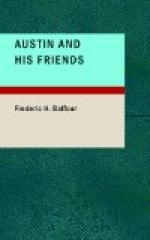At first they played a little at cross-purposes. St Aubyn, with the tact of an accomplished man entertaining a clever youth, tried to draw Austin out; while Austin, modest in the presence of one whom he recognised as infinitely his superior in everything he most valued, was far more anxious to hear St Aubyn talk than to talk himself. The result was that Austin won, and St Aubyn soon launched forth delightfully upon art, and books, and travel. He had been a great traveller in his day, and the boy listened with enraptured ears to his description of the magnificent gardens in the vicinity of Rome—the Lante, the Torlonia, the Aldobrandini, the Falconieri, and the Muti—architectural wonders that Austin had often read of, but of course had never seen; and then he talked of Viterbo and its fountains, Vicenza the city of Palladian palaces, every house a gem, and Sicily, with its hidden wonders, hidden from the track of tourists because far in the depths of the interior. He had travelled in Burma too, and inflamed the boy’s imagination by telling him of the gorgeous temples of Rangoon and Mandalay; he had been—like everybody else—to Japan; and he had lived for six weeks up country in China, in a secluded Buddhist monastery perched on the edge of a precipice, like an eagle’s nest, where his only associates were bonzes in yellow robes, and the stillness was only broken by the deep-toned temple bell, booming for vespers. Then, somehow, his thoughts turned back to Europe, and he began a disquisition upon the great old masters—Tintoretto, Rembrandt, Velasquez, Tiziano, and Peter Paul—with whose immortal works he seemed as familiar as he subsequently showed himself with the pictures in his own house. He described the Memlings at Bruges, the Botticellis at Florence and the Velasquezes in Spain—averring in humorous exaggeration that beside a Velasquez most other paintings were little better than chromolithographs. Austin put in a word now and then, asked a question or two as occasion served, and so suggested fresh and still more fascinating reminiscences; but he had no desire whatever to interrupt the illuminating stream of words by airing any opinions of his own. It was not until the meal was drawing to a close that the conversation took a more personal turn, and Austin was induced to say something about himself, his tastes, and his surroundings. Then St Aubyn began deftly and diplomatically to elicit something in the way of self-disclosure; and before long he was able to see exactly how things stood—the boy of ideals, of visionary and artistic tastes, of crude fresh theories and a queer philosophy of life, full of a passion for Nature and a contempt for facts, on one hand; and the excellent, commonplace, uncomprehending aunt, with her philistine friends and blundering notions as to what was good for him, upon the other. It was an amusing situation, and psychologically very interesting. St Aubyn listened attentively with a sympathetic smile as Austin stated his case.




